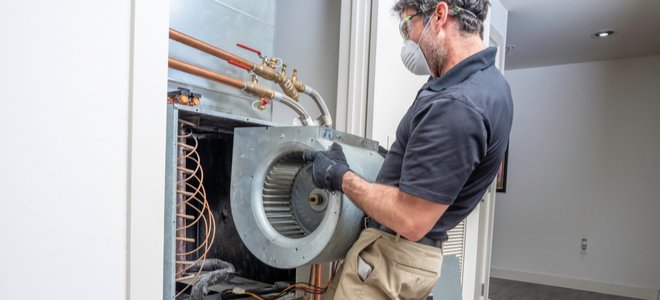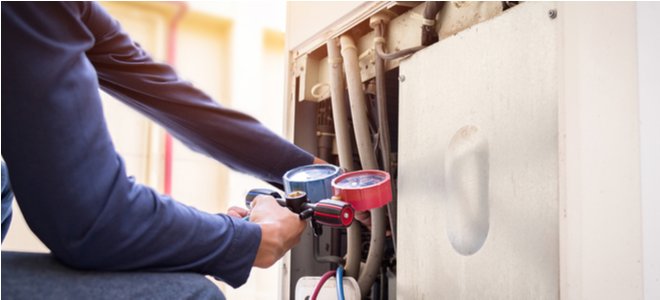 Intermediate
Intermediate
Whether you’re still in high school or are looking for a second career later in life, it’s important to understand the requirements for any job you’re interested in. If you’ve contemplated working as an HVAC professional, consider what it takes to move from DIY to certified.
What HVAC Professionals Do
HVAC is the short-term for heating, ventilation, and air conditioning. Those working in the industry complete tasks related to installation, repair, maintenance, and replacement of components or the entire system.
This can include anything from the heating and cooling furnace to ductwork throughout the house and extend to vents, fans, and outdoor units.
HVAC professionals work in retail, residential, commercial, and office spaces. They analyze air quality and temperature-control mechanisms. They may also deal with refrigeration systems.
Job Titles

Since HVAC is a varied field, there are both jobs that generalize in all aspects of the industry and jobs that focus on a specialty. Common job titles include HVAC technician, HVAC installer, HVAC service manager, refrigeration technician, AC technician, and HVAC engineer.
Work Environment
Those working hands-on in the industry can expect to be crawling around in tight spaces in the basement and attic. HVAC installation and repair is a physical job that requires some agility, physical strength, and knowledge of safety.
The physical environment can be anywhere in the world. It can be near the top of a high-rise or in the belly of a boat. It can be in an aircraft, a mall, a hospital, a restaurant, or a tiny home.
For new construction, you will encounter some dirt and dust but mostly work with new and unsoiled materials. Renovations, repairs, and replacements offer dirty, greasy, tight, hot, cold, and dark environments to complete your tasks.
If you’re in the design/engineering field, most of your work will take place in an office setting instead, although you will go to the job site on occasion.

Education, Licensing, and Certification
The first thing to know about becoming certified as an HVAC professional is that you may not need to be certified as an HVAC professional. Many jobs require little more than a willingness to work hard. However, if you want to take full advantage of job advancement opportunities and pay raises, you’ll want to pursue the certificate. Getting certified may also be a requirement for some jobs, depending on the hiring company.
There is no federal mandate requiring certifications, but some states require it for certain positions. There are other required courses, though. One is the certification mandated by the Environmental Protection Agency (EPA) for anyone who works with refrigerants. That means if you work with refrigeration or AC units, you’ll need to complete recovery and recycling courses related to proper disposal and handling of the materials.
Testing will ensure you understand the environmental impact of the substances. Once complete, the certification doesn’t expire, but as sustainability continues to take center stage, other stipulations may be added, such as the addition in 2018 of HFCs to the list of dangerous refrigerants.
In addition, the US Department of Labor Occupational Safety and Health Administration (OSHA) mandates safety training. However, individual businesses and industry leaders can create their own curriculum as long as it meets the outlined safety standards. Workers typically complete a 10-hour course focused on job safety and health hazards. Another, more comprehensive class is designed for supervisors or others responsible for job safety.
If you do pursue certification as an HVAC professional, you’ll need a high school diploma. Next, gain hands-on experience or find an accredited HVAC training program. Programs run between six months and two years and are followed by a three to five-year apprenticeship. Finally, apply for and complete your HVAC certification exams and fulfill additional requirements in your state.
Pursuing a job in HVAC engineering will require a college-level degree.

Personal Characteristics for HVAC Professionals
Every job has certain personal characteristics that help the job be a more natural match for the person. Becoming an HVAC professional requires problem-solving skills, interpersonal and communication skills, mechanical skills, and time management skills. It also requires the ability to move around in tight spaces, often squatting or crawling as you work.
Safety
Working as an HVAC professional is physically demanding (unless you’re in engineering). With the constantly bruised knuckles and scraped hands comes more serious risks associated with the field, including collapsing structures, serious cuts, falls, and mental challenges such as claustrophobia.
Salary Range
Depending on your job role and location, a career in HVAC can provide a salary between $30,000 and $100,000. Maybe more if you own your own thriving business.
Job Outlook
The job outlook within the HVAC industry is strong, and it’s an opportunity to make a good living wage with little student debt. As personal income grows and global warming increases, air conditioning is more popular than ever, adding to the stability within the industry.
Source link : https://www.doityourself.com/stry/how-to-get-certified-as-an-hvac-professional












